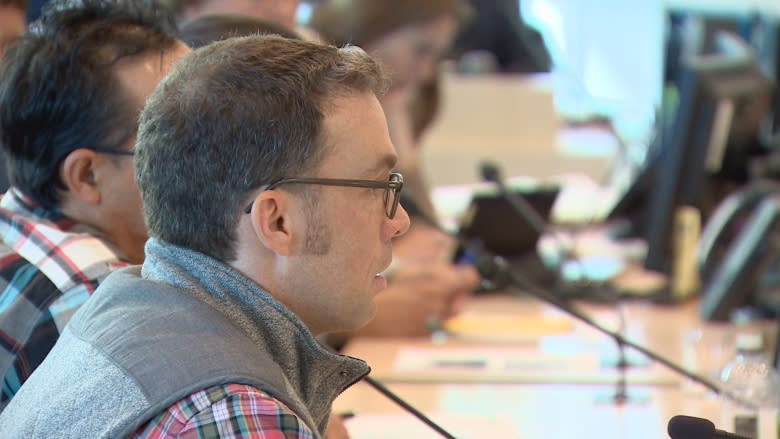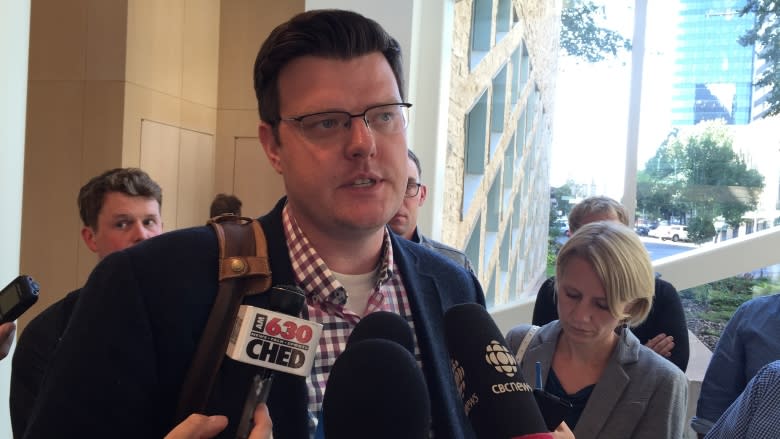Rogers Place benefits committee to change role after criticism
Edmonton's arena benefits committee will change its terms of reference to help it better deal with concerns raised by people who live around Rogers Place, the new downtown home of the NHL Oilers.
The decision came after councillors got an earful Tuesday from community members who complained the committee doesn't want to discuss tangible benefits like affordable housing and jobs that pay a living wage.
"I think its a good step forward," said Jordan Reiniger, one of the members of the newly-formed Edmonton Community Benefits Coalition.
Several community groups and inner-city social service agencies are criticizing the vague and non-binding nature of the community benefits agreement, or CBA, attached to the Rogers Place master agreement.
The agreement was negotiated four years ago by the city and the Katz Group, the company owned by Oilers owner Daryl Katz. Rogers Place is owned by the city but operated by the Oilers.
Changing the role of the community benefits committee was one of three requests Reiniger brought to council. The other two requests are getting the Katz Group to pay its Rogers Place workers a living wage, and to get council to require community benefits agreements for all future developments in the arena district.
"So many of these agreements are between the city and the developer and don't include the voice of the communities," Reiniger said. His group plans to keep pushing the Katz Group on the wage issue.
Still, Reiniger said he is pragmatic about how much his group can negotiate at this point.
"We're hopeful at this table that we can start to have different conversations about the revised terms of reference that are coming through, that we can start to open some of those doors and talk about where some of that funding can be allocated."
Tim Shipton, vice-president of communications for the Oilers Entertainment Group, declined comment on council's decision.
How much is enough?
The question of how much a developer should contribute to a community was at the centre of Tuesday's discussion.
In the case of Rogers Place, the Oilers contend they have exceeded their obligations.
The team has funded a new hospitality training program at Norquest College, and has hired a couple of dozen people from disadvantaged groups to work on construction. The Oilers have also held job fairs for clients of community and social organizations.
Then there are the tax and revitalization benefits from the additional development that has sprung up around the arena.
However, critics say the majority of jobs are low-paying, part-time service jobs. They feel the Oilers should have been held to a higher standard through a binding agreement that sets tangible benchmarks.
"A publicly funded, private company has a moral and social obligation to give back to the community," Queen Mary Park business owner Trevor Belsher told councillors. "If not, then there has to be a legal obligation."
Coun. Michael Oshry asked what leverage anyone has to reopen talks with the Oilers owner now that the arena is built.
Reiniger said the city could require binding CBAs for any future developments the Katz Group wants to build on the arena land.
Binding agreements for all
Earlier Tuesday, councillors were urged to negotiate binding community benefit agreements for all future developments.
An update to council about the $600-million arena development gave those groups the chance to express their concerns.
The city should have negotiated from the outset a binding CBA with the Katz Group, owners of the Edmonton Oilers, particularly since the arena was financed with public money, said Jay Scherer, an associate professor at the University of Alberta who is studying the Rogers Place development.
Scherer said the CBA for the privately funded LA Live development has become the gold standard, because it contained provisions for affordable housing and ensured that up to 70 per cent of jobs paid a living wage.
He said he expected a city-owned facility such as Rogers Place would pay its employees enough to support themselves.
"We can, and we need to, do better in Edmonton to ensure that all of these issues are addressed proactively," he said, "and that future developments are contingent upon genuine CBAs."
Mayor Don Iveson said council is interested in setting a standard process for community benefits that would provide clarity for both developers and community members.
"Because certainty for everyone would be much better than wheeling and dealing on a case-by-case basis," he said.
Some councillors expressed exasperation that such concerns are being raised now, with the arena set to open next month.
"I've been on council for three years and nobody has ever come to me to say that the CBA needed to be worked on," said Coun. Scott McKeen. "So why now?"



